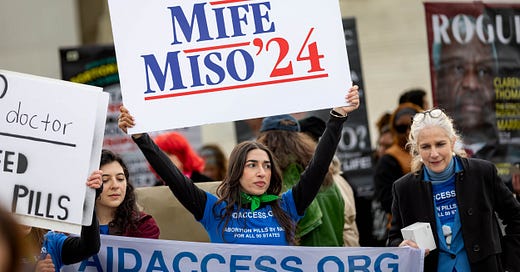2024 Election Results: Abortion Ballot Measure Edition
Your guide to 10 key initiatives and amendments, and how they fared on Election Day
🕒 Update 11:55am, November 6, 2024: Abortion rights were on the ballot in ten states across the country in the 2024 election. Here’s how they fared (click each state to skip ahead)
Arizona Prop 139 – Passed
Colorado Amendment 79 – Passed
Florida Amendment 4 – Didn’t Pass
Maryland Question 1 – Passed
Missouri Amendment 3 – Passed
Montana CI-128 – Passed
Nebraska Initiative 439 – Didn’t Pass, Anti-Abortion 434 Passed
Nevada Question 6 – Passed
New York Prop 1 – Passed
South Dakota Amendment G – Didn’t Pass
ARIZONA PROP 139 WINS
Proposition 139, Right to Abortion Initiative. Read the full amendment here.
Arizona’s Prop. 139 would protect abortion rights until fetal ‘viability’1
Some context for the measure: Arizona’s abortion law was in the national spotlight this year after the state Supreme Court ruled in favor of an 1864 abortion ban—a law passed before women even had the right to vote. If enforced, the law would have replaced Arizona’s 15-week ban with a total abortion ban.
The tremendous backlash to the ruling was a national tipping point of sorts, one where Republicans realized they were in real trouble with voters. As such, national GOP leaders pressured two Arizona Republican lawmakers to vote with Democrats to repeal the law. As a result of the ruling, backlash, repeal and more, voters turned out in higher numbers to sign the petition in support of putting Prop. 139 on the ballot.
Opposition messaging: Anti-abortion lawmakers and organizations launched the “It Goes too Far Campaign, which claims that Arizona’s 15-week abortion ban is already a “reasonable compromise.” In fact, the campaign spokespeople say that Arizona’s law isn’t a ban at all: “There is no ban, you know, contrary to what proponents are saying—there's no ban. Abortion is legal here in Arizona up to 15 weeks.”
Attacks on Democracy: Anti-abortion groups sued multiple times in an attempt to keep Prop. 139 off the ballot: They claimed the petition for the measure misled voters, for example, and that pro-choicers didn’t fill out the correct forms. While those suits failed, they were successful in changing the language in an informational pamphlet sent to all Arizona voters about the measure that used the term ‘unborn child’ rather than ‘fetus.’ Arizona Republicans also briefly considered launching a ballot measure effort of their own—one that would undercut Prop. 139 and trick voters into supporting an amendment to enshrine the state’s abortion ban. They were even tossing around feminist-sounding names like the “Arizona Abortion Protection Act” and the “Arizona Abortion and Reproductive Care Act.”
For more information about Prop. 139, go to Arizona Abortion Access for All.
COLORADO AMENDMENT 79 WINS
Amendment 79, Right to Abortion and Health Insurance Coverage Initiative. Read the full amendment here.
Abortion is legal in Colorado, but as is the case in many pro-choice states, abortion rights activists are seeking an extra layer of protection in the state constitution. Amendment 79 would both prevent government interference in pregnancy, and would life a ban on public funding for abortion—ensuring that people can access care regardless of their income level.
What makes Amendment 79 stand out among most other pro-choice ballot measures is that it does not contain any language about restrictions or stop protections for abortion after ‘viability.’ Karen Middleton, president of the abortion rights group Cobalt, has said, “Coloradans trust people and their doctors, not politicians, to make decisions about abortion.”
The measure needs 55% of the vote to pass, but if history is any indication, Colorado is in good shape: Voters have defeated multiple attempts to enshrine fetal personhood and abortion bans in the state constitution, with one 2020 measure losing by nearly 20 points.
Opposition messaging: As expected, the anti-abortion campaign in Colorado is pushing hard on talking points about ‘abortion up until birth’ and the idea of ‘unfettered access’ to abortion. As is the case in other states, anti-abortion groups also claim the amendment would eradicate parental rights.
For more information about Amendment 79, go to Coloradans for Reproductive Freedom.
FLORIDA AMENDMENT 4 LOSES
Amendment 4, Right to Abortion Initiative. Read the full amendment here.
Florida’s Amendment 4 would protect abortion rights until ‘viability’ and after that, when necessary to protect a patient’s health and life. This is the first abortion rights measure since Roe was overturned that will need 60% to pass.
Florida’s abortion rights amendment has serious national implications: Before the state’s 6-week ban went into effect, Florida was an abortion access hub for the entire Southern region. Since abortion was banned, clinics, funds and activists across the country have felt the effects.
Something noteworthy: Republican leaders in Florida tried to use Amendment 4’s ‘viability’ language against pro-choicers. Attorney General Ashley Moody petitioned the state Supreme Court that ‘viability’ has multiple meanings and that the language was meant to deliberately confuse voters. As you know, some abortion rights activists have used ‘viability’ standards in an attempt to preempt conservative claims that they support abortion ‘up until birth’, but anti-abortion groups have largely done that anyway. And in Florida’s case, we got a first look of how Republicans would weaponize the term against pro-choicers.
Opposition messaging: Anti-abortion groups and lawmakers claim that Amendment 4 is extreme, would allow abortion ‘up until birth’, eradicate parental consent, and that it would endanger women’s health. The antis have taken particular hold of language in the measure about “healthcare providers”—arguing that it means even chiropractors could perform abortions.
Attacks on Democracy: In addition to petitioning the state Supreme Court to get the amendment off the ballot altogether, Gov. Ron DeSantis has launched a full-scale assault on Amendment 4 using state agencies and by partnering with anti-abortion organizations. DeSantis weaponized the Florida Agency for Health Care Administration (AHCA), using millions in taxpayer funds to run a disinformation campaign about the pro-choice measure in ads and online.
DeSantis also directed the state health department to threaten television stations running ads for Amendment 4, and has appeared in an ongoing press tour with extremist doctors posing as experts concerned with women’s health.
The attack I’m most worried about though, if the measure passes, is DeSantis’ bogus voter fraud investigation into petition signatures for Amendment 4. Florida Republicans—after sending police to voters’ homes and investigating tens of thousands of already-verified signatures—claim that over 16% of the signatures were invalid. My concern is that they’ll use this in a suit to try to stop enforcement of Amendment 4 if it wins.
For more information on Amendment 4, go to Floridians Protecting Freedom.
MARYLAND QUESTION 1 WINS
Question 1, Right to Reproductive Freedom Amendment. Read the full amendment here.
Question 1 in Maryland would enshrine “the fundamental right to reproductive freedom" and prohibit the state from interfering in that right “unless justified by a compelling state interest achieved by the least restrictive means.”
Abortion is already legal in Maryland, but as is the case with other pro-choice states since Roe was overturned, abortion rights activists are pushing for protection in the state constitution. Like Colorado’s measure, this amendment doesn’t have any language about ‘viability’ restrictions.
Opposition messaging: Anti-abortion activists claim two things: 1) That the law isn’t necessary because Maryland is a pro-choice state and 2) That the measure would allow minors to have abortions and gender-affirming surgeries. The anti-trans talking point is one that shows up in nearly every state with a pro-choice amendment on the ballot. The short version is that Republicans realized that abortion rights were too popular for them to use their normal anti-choice messaging; so they hope that drumming up anti-trans bigotry might be more effective.
For more information on Question 1, go to Freedom in Reproduction Maryland.
If you’ve made it this far, I know you care quite a bit about what happens to abortion rights next week! Abortion, Every Day is pushing in these last days before the election to make sure you have everything you need. But I can’t do it without you: Support the newsletter with a paid subscription:
MISSOURI AMENDMENT 3 WINS
Amendment 3, Right to Reproductive Freedom Initiative. Read the full amendment here.
If abortion rights activists are successful, Missouri will be the first state to overturn a total abortion ban. Amendment 3 would protect abortion rights until ‘viability,’ after which abortion would be legal to protect the life or health of the pregnant person.
There has been lots of controversy over Amendment 3—from critiques within the abortion rights movement over viability restrictions, to a Republican strategist who introduced her own so-called compromise measures. The primary hurdles in Missouri, though, have been from anti-abortion politicians and activists.
Opposition messaging: As they’ve done in other states where abortion is on the ballot, Republicans and anti-abortion groups claim that Amendment 3 is an attack on parental rights and would allow children to get gender-affirming surgery without their guardians’ permission. Republicans also insist that the measure would allow for abortion ‘up until birth,’ and that the measure would eliminate health and safety standard for abortion.
Attacks on Democracy: Missouri Republicans started to undermine democracy before pro-choice activists even had a chance to collect signatures for the measure. In fact, Republican Attorney General Andrew Bailey held up signature-gathering for months by refusing to sign off on a cost estimate for the measure.
Even though the state auditor estimated that restoring abortion rights would cost the state $51,000, Bailey wanted the number changed to $51 billion. After months of stalling and legal fights, the state Supreme Court finally forced Bailey to sign off on the (accurate) estimate.
Missouri’s Republican Secretary of State Jay Ashcroft also drafted a biased ballot summary that claimed Amendment 3 “would allow for “dangerous, unregulated and unrestricted abortion” by those without a medical license.” He fought for months to get the propaganda/summary in front of voters this November, but was thankfully stopped by the courts.
All of that was happening at the same time that anti-abortion activists launched a scare tactic campaign against Amendment 3—including sending voters text messages warning them away from signing the pro-choice petition by claiming activists were trying to steal their identities. They also unsuccessfully sued to keep Amendment 3 off the ballot and away from voters.
For more information on Amendment 3, go to Missourians for Constitutional Freedom.
MONTANA CI-128 WINS
Constitutional Initiative 128, Right to Abortion Initiative. Read the full amendment here.
Abortion is legal in Montana, but abortion rights activists are seeking protections in the state constitution—both as a long term safeguard and because Montana Republicans have been relentlessly trying to roll back reproductive rights.
It wasn’t so long ago that Montana voters rejected an anti-abortion ballot measure: In 2022, conservatives put a ‘Born Alive’ measure in front of Montanans—a law that they claimed would mandate doctors save babies ‘born alive’ in botched abortions. (This is not a thing; the measure was really about establishing fetal personhood.) Doctors pointed out that the law would force doctors to perform invasive medical procedures on fatally-ill newborns, instead of allowing parents a few last peaceful moments with their children.
All of which is to say: Voters in Montana don’t support government interference in personal medical decisions.
Opposition messaging: The anti-abortion talking points in Montana have followed the familiar pattern we’ve seen in other states: claims that it would eradicate parental rights and stripe away health and safety regulations for women.
Attacks on Democracy: Montana Republicans tried a few different tactics to keep voters from having a say on abortion. First, Attorney General Austin Knudsen said the measure was “legally insufficient.” He claimed that the amendment is too confusing for voters—and that it’s actually multiple amendments. Knudsen argued that because the measure prevents the state from punishing people based on pregnancy outcomes, the amendment goes beyond just abortion. (This is something anti-abortion groups tried to do in Ohio as well.)
Montana’s Supreme Court ruled against Knudsen and let the measure move forward. Then the AG rewrote the ballot summary—again, a tactic we’ve seen in other states—to be as biased as possible. Once again, the state Supreme Court stopped him.
But Republicans weren’t done yet: This summer, the Republican Secretary of State’s office started removing signatures from the petition for CI-128—claiming the voters were ‘inactive’ and therefore ineligible to sign ballot petitions. They were stopped by the courts, but the attack showed just how far the state GOP is willing to go to stop voters from having a say.
For more information on CI-128, go to Montanas Securing Reproductive Rights.
NEBRASKA I-439 LOSES AND I-434 WINS
Nebraska Initiative 439 Right to Abortion Initiative. Read the full amendment here.
Nebraska is the one state where there are two abortion-related amendments on the ballot. One would protect abortion rights until ‘viability’, the other would enshrine the state’s 12-week abortion ban into the state constitution (and leave open the possibility for further restrictions).
The anti-abortion measure was drafted specifically to confuse Nebraskans; conservatives know that voters support abortion rights, so they created NI-434 in the hopes to siphon voters from the real pro-choice measure. The anti-abortion group even chose a similar-sounding name: Protect Women and Children. (The pro-choice group is Protect Our Rights.)
Opposition messaging: Anti-abortion groups insist that NI-439 would eradicate parental rights, strip away vital health and safety protections, and allow abortion ‘up until birth’. In other words, they’re repeating the messages we’ve seen in most states with abortion on the ballot.
Attacks on Democracy: The most obvious anti-democratic attack is the creation of that second abortion-related ballot measure. Initiative 434 was launched specifically to trick voters into enshrining Nebraska’s abortion ban into the state constitution. In fact, petitioners for 434 gathered signatures by telling voters they’d be supporting a “pro-choice” petition. Hundreds of Nebraskans complained to the Secretary of State’s office about being lied to by signature-gatherers, and it’s likely that many more never even realized that they were misled.
For more information on NI-439, go to Protect Our Rights.
NEVADA QUESTION 6 WINS
Question 6, Right to Abortion Initiative. Read the full amendment here.
Question 6 would protect abortion rights until ‘viability’, or when necessary to protect the health or life of the pregnant person. Nevada is a pro-choice state, but abortion rights activists want to add an extra layer of protection in the state constitution.
What makes Nevada a bit different is that the measure needs to pass twice before being adopted: Voters will need to approve it this November, and then again in 2026.
Opposition messaging: Nevada anti-abortion groups have used the same tactics we’ve seen in other pro-choice states—namely, claiming that abortion is already legal and ‘safe’ so voters don’t need to bother supporting the amendment.
Attacks on Democracy: An anti-abortion PAC sued over the measure, using a legal strategy we’ve seen in other states like Ohio—they argued that the measure violates the state’s single subject rule because its original language prohibited government interference not just in decisions about abortion, but birth control, miscarriage care, etc. The suit was unsuccessful.
For more information on Nevada Question 6, go to Nevadans for Reproductive Freedom.
NEW YORK PROP 1 WINS
Proposal 1, Equal Protection of Law Amendment. Read the full amendment here.
Prop 1 is a little different than the other abortion rights ballot measures heading to voters next week because it’s an equal rights amendment. It would add protections in the state constitution to prohibit discrimination of all sorts—including discrimination based on pregnancy status.
New York Republicans won a legal fight over Prop 1’s language, so the word ‘abortion’ isn’t actually included in the measure. (The GOP knows just how popular abortion rights are and didn’t want to tip voters off.)
Opposition Messaging: Anti-abortion groups have launched a well-funded disinformation campaign in New York, claiming that Prop 1 would eradicate parental rights. They’ve also used the anti-trans talking points we’ve seen in other states, with messages about keeping ‘boys out of girls’ locker rooms.’ There have even been signs all over the state telling people to “Protect Girls Sports” by voting ‘no’ on Prop 1.
For more information on Proposal 1, go to New Yorkers for Equal Rights.
SOUTH DAKOTA AMENDMENT G LOSES
Constitutional Amendment G, Right to Abortion Initiative. Read the full amendment here.
Amendment G would protect abortion rights in the state constitution through the first trimester; allow regulations in the second trimester “only in ways that are reasonably related to the physical health of the pregnant woman”; and would prohibit government regulations in the third trimester if a doctor deems it necessary to save a patients’ health and life.
There’s been controversy within the pro-choice movement over this measure because it’s more restrictive than other proposed amendments throughout the country. The ACLU of South Dakota and regional Planned Parenthood declined to endorse the measure, concerned that it doesn’t offer enough protections. The abortion rights activists behind the measure, however, say they’re just trying to meet South Dakota voters where they’re at.
Opposition messaging: Anti-abortion messaging in South Dakota claims that the amendment would eradicate parental rights, allow for abortions ‘up until birth,’ and that it would eliminate health and safety standards.
Attacks on Democracy: There have been an extraordinary number of anti-democratic attacks in South Dakota, from preventing petitioners from gathering signatures in certain high-traffic areas to an ongoing lawsuit against the measure that still hasn’t been resolved.
Anti-abortion activists also called voters posing as employees of the Secretary of State’s office, pressuring them to remove their names from the petition. That’s in part because Republicans passed a law that would allow them to invalidate the amendment if they could convince (or intimidate) even a handful of people to withdraw their signatures after the fact.
For more information on Amendment G, go to Dakotans for Health.
You’ll notice that most of these measures protect abortion rights until fetal ‘viability.’ Please know that ‘viability’ is not a real medical standard, but a legal term invented by a few judges and a law clerk. Whether or not a fetus can survive on its own is determined by all sorts of factors, not a specific line in pregnancy. (WNYC’s “More Perfect” podcast did a helpful series on this, for those interested.)








Thank you for this, Jessica!
It was great to see you on with Joy Reid and Alex Wagner yesterday.
If anyone missed it, here's a youtube link: https://www.youtube.com/watch?v=bUwMDc5zRlQ
Here is a powerful video about abortion I found on Red, Wine and Blue, called Red, White and Blue.
https://youtu.be/b-nn_dNEEQw?si=eXFMilRIckl_8hAw
Please share it.
Viva la Kamala!